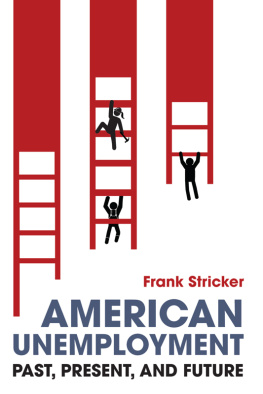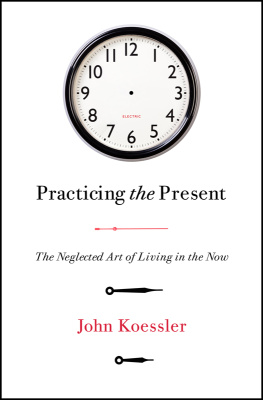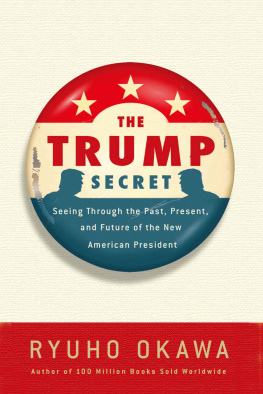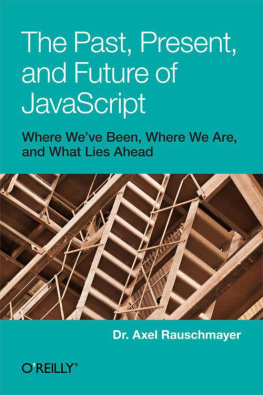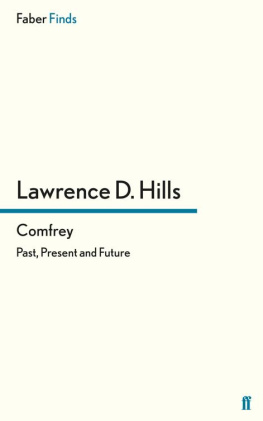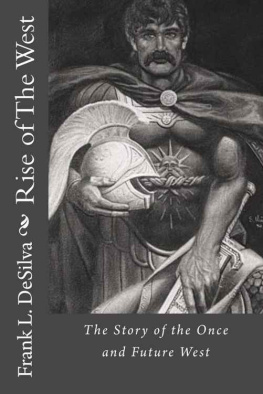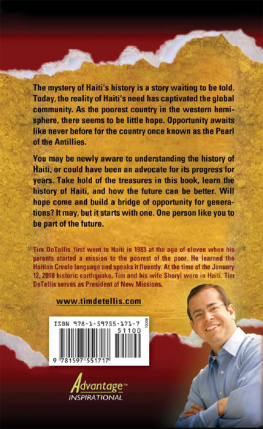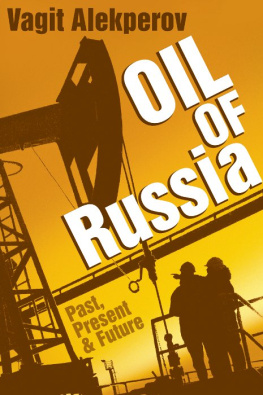2020 by the Board of Trustees
of the University of Illinois
All rights reserved
Library of Congress Cataloging-in-Publication Data
Names: Stricker, Frank, author.
Title: American unemployment : past, present, and future / Frank Stricker.
Description: Urbana : University of Illinois Press, 2020. | Includes bibliographical references and index.
Identifiers: LCCN 2019052185 (print) | LCCN 2019052186 (ebook) | ISBN 9780252043154 (cloth) | ISBN 9780252085024 (paperback) | ISBN 9780252052033 (ebook)
Subjects: LCSH : UnemploymentUnited StatesHistory. | United StatesEconomic conditions. | United StatesSocial conditions.
Classification: LCC HD 5724 . S 7343 2020 (print) | LCC HD 5724 (ebook) | DDC 331.13/7973dc23
LC record available at https://lccn.loc.gov/2019052185
LC ebook record available at https://lccn.loc.gov/2019052186
To my wife, Deborah Schopp,
to Vonn, Alexis, Nancy, and Ray,
and to everyone who supported the projectThe only difference between a derelict and a man is a job.
William Powell at the Hooverville Dump,
in My Man Godfrey (1936)
Acknowledgments
S ome of the learning that went into American Unemployment occurred over several decades. I was not trained as an economist, but I began paying attention to the U.S. economy in the 1970s and 1980s. The people in the Los Angeles chapter of the New American Movement (NAM) in the early 1970s taught me much, and I learned more in the Westcoast Association of Marxist Historians (WAMH) in the early 1980s. An offshoot of WAMH was a research group whose members shared drafts of articles and chapters for critical evaluation. These colleagues read every chapter of my book, and sometimes more than once. They include Craig Loftin, Steve Ross, Nancy Fitch, Leila Zenderland, Bob Slayton, Jan Reiff, Hal Baron, Becky Nicolaides, and Tobie Higbie.
In recent years, the organization that has most shaped my understanding of unemployment is the National Jobs for All Network (formerly the National Jobs for All Coalition). I was moving toward NJFACs position on the importance of hidden unemployment when I published my first book, Why America Lost the War on Povertyand How to Win It. As I contacted people about the poverty book, Sheila Collins suggested that I become a member of NJFAC. She was right. I joined and have worked in the coalition for a decade now. Many individuals in the organization have helped me think about the subjects of my book. I cannot name them all but they include June Zaccone, who creates NJFANs monthly alternative unemployment rate; Trudy Goldberg, who read chapters and was always supportive; Logan Martinez, the lead organizer; Helen Ginsburg, who read chapters, gave me insights into organizations that preceded NJFAC, and supplied several sources; and, finally, a group that included William Darity Jr. and involved an online discussion of definitions of full employment.
Over the years, many people have been generous. Social work expert David Wagner read sections and gave me sources and a statement for . Labor lawyer Tom Donahoe answered questions in his specialty, and economists Jim Devine and Tom Larson responded to many inquiries over many years. Sharla Solsma and Liz Tamoush offered psychological perspectives. Forty people responded to an informal survey about job-searching. Matthew Hart provided key facts and perspectives about grocery employees and the United Food and Commercial Workers, and Mike McGrorty educated me about welder training classes and other work issues.
Federal employees provided speedy answers to my questions. They include, at the Bureau of Labor Statistics, Ben Cover, John Mullins, Hyun Choi, Terence McMenamin, Fran Horvath, Michelle Mayfield, Catherine Wood, John Galvin, Eliot Davila, and Emy Sok; and at the Bureau of Economic Analysis, Lisa Mataloni, who tutored me on GDP measurements. The librarians at California State University, Dominguez Hills, especially Robert Downs, were very helpful. Many sections of this book could not have been written without the work of journalists and blog writers. They receive credit in the endnotes, and include Don Lee and Alana Semuels at the Los Angeles Times and Peter S. Goodman at the New York Times.
I am sure I am leaving out people who critiqued the manuscript, but readers include Lois Feuer and the late Tony Garavente. At a key point, Edward Kantowicz gave the whole manuscript a thorough, speedy, and sympathetic going-over. He helped me cut and paste. Marc Holcombe read the whole manuscript with care, and Joan Williams evaluated several chapters. Retired English teachers Bill and Jeri Roberts read several chapters at different times, and near the end, they proofed the whole manuscript. Derk Richardson, an author and editor, gave the entire manuscript a close read and recommended many needed corrections. My niece, Deborah Stricker Josephs, commented on several sections.
The two outside readers at the University of Illinois Press, Phil Harvey and Melvyn Dubofsky, and my editor, James Engelhardt, helped me turn the manuscript into a viable book. I started learning from Jamess recommendations almost as soon as we began corresponding. Mel offered many criticisms, and the revisions I produced in response made the book fairer and stronger. Phils review provided a big boost. Once the book went into production, Tad Ringo managed the process with diligence and a gentle touch.
Finally, my wife Deborah Schopp read every chapter many times and without complaint. And whether she was reading the manuscript or not, she was making my life much better in so many ways.
Introduction
I n retrospect, it is clear that my job history has not been typical of what many Americans go through. Many have to deal with extended periods of unemployment and low pay, even in their mature years, and most employees change jobs quite a few times. I had periods of unemployment and several years of worry about whether my job as a professor would last, but as it turned out, most of the time I had work, and at two jobs that paid me well and made me feel that I was doing something useful.
Up until the time I went away to graduate school, I had an excellent part-time job. I was well paid and never laid off. I was the only employee in a painting company and the painter-owner was my father.
After graduate school, it took me a while to find permanent employment. I did not like the job-search process. There werent enough jobs and I did not have confidence that I would get a position. And I was struggling to finish my dissertation. I traveled for interviews and presentations to Gary, Indiana, upstate New York, and Ottawa, Canada, where there were two positions at Carleton University. One of the interviewers there told me he was sure I would get the job. I did not. Two friends of mine, one from my pre-college years and one from graduate school, got hired. That worked out okay.
I taught as a visiting professor at UCLA for one year and then was out of work for another. I did some job-searching but found nothing. No unemployment compensation either. I did not know enough to think about whether I could get it. My spouse had a job, but we werent affluent. I returned to Chicago to paint houses with my dad for a couple of weeks. Later, my brother hooked me up with a friend who owned a shoe store in Los Angeles, and that man paid me for several days of work straightening out boxes in the back room. I doubt that the work I performed was very important, but I appreciate the kindness. It was a nice thing that the owner did for me.


